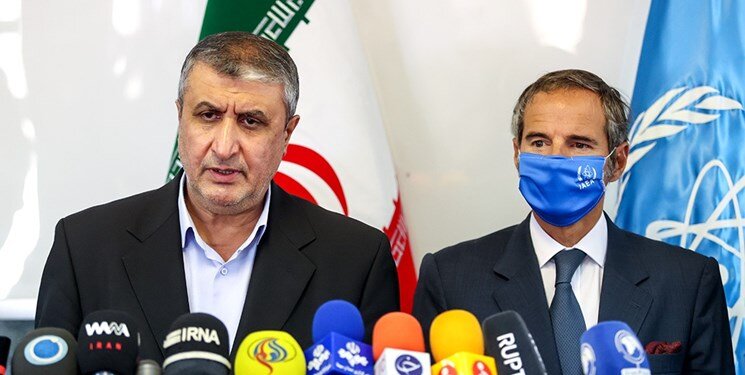Iran, IAEA release joint statement

TEHRAN — The International Atomic Energy Agency (IAEA) and Iran issued a joint statement late on Saturday for closer cooperation.
The statement was released immediately after IAEA director general Rafael Grossi returned to Vienna after his talks on Saturday with Mohammad Eslami, chief of the Atomic Energy Organization of Iran (AEOI), in Tehran.
The statement reads as follows:
“The Vice-President of the Islamic Republic of Iran and President of the Atomic Energy Organization of Iran (AEOI) and the Director General of the International Atomic Energy Agency (IAEA) agreed on the following Joint Statement for the clarification of the issues mentioned in GOV/2021/52 of 17 November 2021.
The AEOI and the IAEA agreed, in continuation of their cooperation as stated in the Joint Statement of 26 August 2020, to accelerate and strengthen their cooperation and dialogue aimed at the resolution of the issues.
In this context, the AEOI and the IAEA agreed on the following:
1. The AEOI will provide to the IAEA no later than 20 March 2022 written explanations including related supporting documents to the questions raised by the IAEA which have not been addressed by Iran on the issues related to three locations.
2. Within two weeks after receiving the AEOI’s written explanations and related supporting documents, the IAEA will review this information and will submit to the AEOI any questions on received information.
3. Within one week after the IAEA has submitted to the AEOI any questions on such information, the IAEA and AEOI will meet in Tehran to address the questions. Separate meetings will be held for each location.
4. Upon completion of the activities set out in paragraphs 1 to 3 above and following the corresponding evaluation by the Agency, the Director General will aim to report his conclusion by the June 2022 Board of Governors.”
The joint statement can outline the achievements of Grossi's trip to Iran.
Knowing that the purpose of the trip was to agree on a common solution for the three current safeguards issues between Iran and the Agency, although the Vienna talks have had relatively notable results, Iran has stated that reaching a final agreement requires resolving the remaining issues between Iran and the IAEA.
Iran has repeatedly stressed in the Vienna talks that simultaneous acceptance of restrictions and extensive monitoring resulting from the implementation of the Joint Comprehensive Plan of Actions (JCPOA) on Iran’s nuclear program by continuing the process of pursuing the previously closed safeguards file and reopening a new file with political instincts is unfair and cannot be done at all.
Although the trip in the midst of the ongoing talks in Vienna has removed one of the few obstacles to reaching a strong agreement, the way Iran's future interaction with the IAEA and Western countries depends on the proper implementation of the joint statement and future developments.
Meanwhile in a tweet on Sunday, Mikhail Ulyanov, Russia’s ambassador to the international organizations in Vienna, said, “The visit of the #IAEA Director General Mr. Rafael Grossi to Iran yesterday was very successful. The two sides agreed on concrete steps aimed at settling outstanding safeguards issues within a reasonable period of time. Great achievement!”
